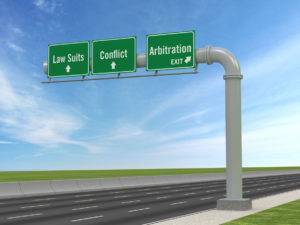Arbitration can be Your Friend

- Who gets the last cookie?
- Who gets to sit in a particular chair?
- Who gets to keep the dollar bill found on the floor?
- Who is responsible for cleaning up a mess?
In these significant matters, I may ask probing questions of each child involved to try to ascertain the facts and then make a decision which seems fair and appropriate. While on a different scale, these episodes are similar to contending parties submitting their dispute to arbitration for a final decision.
Arbitration is the process through which parties submit a dispute to an impartial third-party for a ruling outside of the more formal court system. Typically, parties participating in arbitration agree to do so because they believe the arbitration will be less costly and less time-consuming than going to court. Often people even agree to arbitration before an argument arises. They do this by including language in a contract that states that if any disputes arise from the contract, then the question must be decided by arbitration. Arizona even has a law specifically addressing these types of agreements:
A written agreement to submit any existing controversy to arbitration or a provision in a written contract to submit to arbitration any controversy thereafter arising between the parties is valid, enforceable and irrevocable, save upon such grounds as exist at law or in equity for the revocation of any contract. (A.R.S. § 12-1501).
In most circumstances, such an agreement to arbitrate will be enforceable and prevent the parties from filing a lawsuit in court. While the parties can agree to how the arbitration will be handled, most arbitrations involve the parties agreeing on an arbitrator (often a retired judge or other lawyer with significant experience), a limited discovery period (time in which the parties exchange evidence, take witness depositions, etc.), and an arbitration hearing. Such hearings often occur at the arbitrator’s office and include the presentation of testimony evidence. After the arbitrator makes a decision, the parties typically are able to have it formally confirmed to give it the same legal effect as if it came from a judge.
While it may not be the best option in every case, it is worth discussing with your attorney whether arbitration is available and effective for resolving your legal claims. We would be happy to meet with you to discuss your case. We can be reached at at (480) 833-1113.





